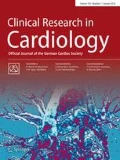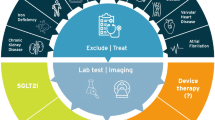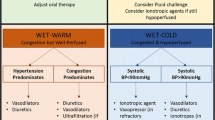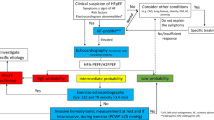Abstract
Background
Cardiogenic shock (CS) complicating acute myocardial infarction (AMI) is associated with high mortality. Previous studies regarding gender-specific differences in CS are conflicting and there are insufficient data for the presence of gender-associated differences in the contemporary percutaneous coronary intervention era. Aim of this study was therefore to investigate gender-specific differences in a large cohort of AMI patients with CS undergoing contemporary treatment.
Methods
In the randomized Intra-aortic Balloon Pump in Cardiogenic Shock II (IABP-SHOCK II) trial, 600 patients with CS complicating AMI undergoing early revascularization were assigned to therapy with or without intra-aortic balloon pump. We compared sex-specific differences in these patients with regard to baseline and procedural characteristics as well as short- and long-term clinical outcome.
Results
Of 600 patients 187 (31 %) were female. Women were significantly older than men and had a significantly lower systolic and diastolic blood pressure at presentation (p < 0.05 for all). Diabetes mellitus and hypertension were more frequent in women, whereas smoking was more frequent in men (p < 0.05 for all). Women showed a higher mortality within the first day after randomization (p = 0.004). However, after multivariable adjustment this numerical difference was no longer statistically significant. No gender-related differences in clinical outcome were observed after 1, 6 and 12 months of follow-up.
Conclusion
In this large-scale multicenter study in patients with CS complicating AMI, women had a worse-risk profile in comparison to men. No significant gender-related differences in treatment as well as short- and long-term outcome were observed.



Similar content being viewed by others
Abbreviations
- AMI:
-
Acute myocardial infarction
- CABG:
-
Coronary artery bypass grafting
- CS:
-
Cardiogenic shock
- IABP:
-
Intra-aortic balloon pump
- LMCA:
-
Left-main coronary artery
- PCI:
-
Percutaneous coronary intervention
- STEMI:
-
ST-segment-elevation myocardial infarction
References
Thiele H, Schuler G (2009) Cardiogenic shock: to pump or not to pump? Eur Heart J 30(4):389–390. doi:10.1093/eurheartj/ehp030
Goldberg RJ, Spencer FA, Gore JM, Lessard D, Yarzebski J (2009) Thirty-year trends (1975 to 2005) in the magnitude of, management of, and hospital death rates associated with cardiogenic shock in patients with acute myocardial infarction: a population-based perspective. Circulation 119(9):1211–1219. doi:10.1161/CIRCULATIONAHA.108.814947
Velders MA, Boden H, van Boven AJ, van der Hoeven BL, Heestermans AA, Cannegieter SC, Umans VA, Jukema JW, Hofma SH, Schalij MJ (2013) Influence of gender on ischemic times and outcomes after ST-elevation myocardial infarction. Am J Cardiol 111(3):312–318. doi:10.1016/j.amjcard.2012.10.007
Berger JS, Elliott L, Gallup D, Roe M, Granger CB, Armstrong PW, Simes RJ, White HD, Van de Werf F, Topol EJ, Hochman JS, Newby LK, Harrington RA, Califf RM, Becker RC, Douglas PS (2009) Sex differences in mortality following acute coronary syndromes. JAMA 302(8):874–882. doi:10.1001/jama.2009.1227
MacIntyre K, Stewart S, Capewell S, Chalmers JW, Pell JP, Boyd J, Finlayson A, Redpath A, Gilmour H, McMurray JJ (2001) Gender and survival: a population-based study of 201,114 men and women following a first acute myocardial infarction. J Am Coll Cardiol 38(3):729–735
Grau M, Sala C, Sala J, Masia R, Vila J, Subirana I, Ramos R, Elosua R, Brugada R, Marrugat J (2012) Sex-related differences in prognosis after myocardial infarction: changes from 1978 to 2007. Eur J Epidemiol 27(11):847–855. doi:10.1007/s10654-012-9712-8
Miric L, Miric D, Duplancic D, Kokic S, Ljutic D, Pesutic V, Culic V, Fabijanic D, Titlic M (2008) Specific and gender differences between hospitalized and out of hospital mortality due to myocardial infarction. Coll Antropol 32(2):361–367
Jneid H, Fonarow GC, Cannon CP, Hernandez AF, Palacios IF, Maree AO, Wells Q, Bozkurt B, Labresh KA, Liang L, Hong Y, Newby LK, Fletcher G, Peterson E, Wexler L (2008) Sex differences in medical care and early death after acute myocardial infarction. Circulation 118(25):2803–2810. doi:10.1161/circulationaha.108.789800
Akhter N, Milford-Beland S, Roe MT, Piana RN, Kao J, Shroff A (2009) Gender differences among patients with acute coronary syndromes undergoing percutaneous coronary intervention in the American College of Cardiology-National Cardiovascular Data Registry (ACC-NCDR). Am Heart J 157(1):141–148. doi:10.1016/j.ahj.2008.08.012
Jackson EA, Moscucci M, Smith DE, Share D, Dixon S, Greenbaum A, Grossman PM, Gurm HS (2011) The association of sex with outcomes among patients undergoing primary percutaneous coronary intervention for ST elevation myocardial infarction in the contemporary era: insights from the Blue Cross Blue Shield of Michigan Cardiovascular Consortium (BMC2). Am Heart J 161(1):106–112.e101. doi:10.1016/j.ahj.2010.09.030
Sadowski M, Gasior M, Gierlotka M, Janion M, Polonski L (2011) Gender-related differences in mortality after ST-segment elevation myocardial infarction: a large multicentre national registry. EuroIntervention 6(9):1068–1072. doi:10.4244/eijv6i9a186
Hasdai D, Topol EJ, Califf RM, Berger PB, Holmes DR Jr (2000) Cardiogenic shock complicating acute coronary syndromes. Lancet 356(9231):749–756. doi:10.1016/s0140-6736(00)02640-4
Kolte D, Khera S, Aronow WS, Mujib M, Palaniswamy C, Sule S, Jain D, Gotsis W, Ahmed A, Frishman WH, Fonarow GC (2014) Trends in incidence, management, and outcomes of cardiogenic shock complicating ST-elevation myocardial infarction in the United States. J Am Heart Assoc 3(1):e000590. doi:10.1161/jaha.113.000590
Koeth O, Zahn R, Heer T, Bauer T, Juenger C, Klein B, Gitt AK, Senges J, Zeymer U (2009) Gender differences in patients with acute ST-elevation myocardial infarction complicated by cardiogenic shock. Clin Res Cardiol 98(12):781–786. doi:10.1007/s00392-009-0080-7
Fincke R, Hochman JS, Lowe AM, Menon V, Slater JN, Webb JG, LeJemtel TH, Cotter G (2004) Cardiac power is the strongest hemodynamic correlate of mortality in cardiogenic shock: a report from the SHOCK trial registry. J Am Coll Cardiol 44(2):340–348. doi:10.1016/j.jacc.2004.03.060
Movahed MR, Khan MF, Hashemzadeh M, Hashemzadeh M (2014) Gradual decline in the age-adjusted in-hospital mortality rate from STEMI-related cardiogenic shock irrespective of cause, race or gender with persistent higher mortality rates in women despite multivariate adjustment. J Invas Cardiol 26(1):7–12
Wong SC, Sleeper LA, Monrad ES, Menegus MA, Palazzo A, Dzavik V, Jacobs A, Jiang X, Hochman JS (2001) Absence of gender differences in clinical outcomes in patients with cardiogenic shock complicating acute myocardial infarction. A report from the SHOCK Trial Registry. J Am Coll Cardiol 38(5):1395–1401
Abdel-Qadir HM, Ivanov J, Austin PC, Tu JV, Dzavik V (2013) Sex differences in the management and outcomes of Ontario patients with cardiogenic shock complicating acute myocardial infarction. Can J Cardiol 29(6):691–696. doi:10.1016/j.cjca.2012.09.020
Kunadian V, Qiu W, Bawamia B, Veerasamy M, Jamieson S, Zaman A (2013) Gender comparisons in cardiogenic shock during ST elevation myocardial infarction treated by primary percutaneous coronary intervention. Am J Cardiol 112(5):636–641. doi:10.1016/j.amjcard.2013.04.038
Thiele H, Zeymer U, Neumann FJ, Ferenc M, Olbrich HG, Hausleiter J, Richardt G, Hennersdorf M, Empen K, Fuernau G, Desch S, Eitel I, Hambrecht R, Fuhrmann J, Bohm M, Ebelt H, Schneider S, Schuler G, Werdan K (2012) Intraaortic balloon support for myocardial infarction with cardiogenic shock. N Engl J Med 367(14):1287–1296. doi:10.1056/NEJMoa1208410
Thiele H, Zeymer U, Neumann FJ, Ferenc M, Olbrich HG, Hausleiter J, de Waha A, Richardt G, Hennersdorf M, Empen K, Fuernau G, Desch S, Eitel I, Hambrecht R, Lauer B, Bohm M, Ebelt H, Schneider S, Werdan K, Schuler G (2013) Intra-aortic balloon counterpulsation in acute myocardial infarction complicated by cardiogenic shock (IABP-SHOCK II): final 12 month results of a randomised, open-label trial. Lancet 382(9905):1638–1645. doi:10.1016/S0140-6736(13)61783
Thiele H, Schuler G, Neumann FJ, Hausleiter J, Olbrich HG, Schwarz B, Hennersdorf M, Empen K, Fuernau G, Desch S, de Waha S, Eitel I, Hambrecht R, Bohm M, Kurowski V, Lauer B, Minden HH, Figulla HR, Braun-Dullaeus RC, Strasser RH, Rochor K, Maier SK, Mollmann H, Schneider S, Ebelt H, Werdan K, Zeymer U (2012) Intraaortic balloon counterpulsation in acute myocardial infarction complicated by cardiogenic shock: design and rationale of the Intraaortic Balloon Pump in Cardiogenic Shock II (IABP-SHOCK II) trial. Am Heart J 163(6):938–945. doi:10.1016/j.ahj.2012.03.012
Vukmir RB (2003) Prehospital cardiac arrest and the adverse effect of male gender, but not age, on outcome. J Women’s Health 12(7):667–673. doi:10.1089/154099903322404311
Sadowski M, Gutkowski W, Janion-Sadowska A, Gasior M, Gierlotka M, Janion M, Polonski L (2013) Acute myocardial infarction due to left main coronary artery disease: a large multicenter national registry. Cardiol J 20(2):190–196. doi:10.5603/cj.2013.0033
Soleimani A, Abbasi A, Kazzazi EH, Hosseini K, Salirifar M, Darabian S, Sadeghian S, Sheikhfathol-Lahi M (2009) Prevalence of left main coronary artery disease among patients with ischemic heart disease: insights from the Tehran Angiography Registry. Miner Cardioangiol 57(2):175–183
Campbell DJ, Somaratne JB, Jenkins AJ, Prior DL, Yii M, Kenny JF, Newcomb AE, Kelly DJ, Black MJ (2011) Differences in myocardial structure and coronary microvasculature between men and women with coronary artery disease. Hypertension 57(2):186–192. doi:10.1161/hypertensionaha.110.165043
Marcolino MS, Simsek C, de Boer SP, van Domburg RT, van Geuns RJ, de Jaegere P, Akkerhuis KM, Daemen J, Serruys PW, Boersma E (2012) Short- and long-term major adverse cardiac events in patients undergoing percutaneous coronary intervention with stenting for acute myocardial infarction complicated by cardiogenic shock. Cardiology 121(1):47–55. doi:10.1159/000336154
Rene AG, Genereux P, Ezekowitz M, Kirtane AJ, Xu K, Mehran R, Brener SJ, Stone GW (2014) Impact of atrial fibrillation in patients with ST-elevation myocardial infarction treated with percutaneous coronary intervention (from the HORIZONS-AMI [Harmonizing Outcomes With Revascularization and Stents in Acute Myocardial Infarction] trial). The American journal of cardiology 113(2):236–242. doi:10.1016/j.amjcard.2013.09.016
Eitel I, Desch S, de Waha S, Fuernau G, Gutberlet M, Schuler G, Thiele H (2012) Sex differences in myocardial salvage and clinical outcome in patients with acute reperfused ST-elevation myocardial infarction: advances in cardiovascular imaging. Circ Cardiovasc Imaging 5(1):119–126. doi:10.1161/circimaging.111.965467
Lehmkuhl E, Kendel F, Gelbrich G, Dunkel A, Oertelt-Prigione S, Babitsch B, Knosalla C, Bairey-Merz N, Hetzer R, Regitz-Zagrosek V (2012) Gender-specific predictors of early mortality after coronary artery bypass graft surgery. Clin Res Cardiol 101(9):745–751. doi:10.1007/s00392-012-0454-0
Acknowledgements
The IABP-SHOCK II-trial has been approved by the local ethics committee at each participating center and has therefore been performed in accordance with the ethical standards laid down in the 1964 Declaration of Helsinki and its later amendments. All patients or their legally authorized representatives provided written informed consent. Supported by grants from the German Research Foundation, the German Heart Research Foundation, the German Cardiac Society, Arbeitsgemeinschaft Leitende Kardiologische Krankenhausärzte, and the University of Leipzig-Heart Center and by unrestricted grants from Maquet Cardiopulmonary and Teleflex Medical.
Conflict of interest
Dr. Thiele reports receiving consulting fees from Eli Lilly, grant support on behalf of his institution from Eli Lilly and Terumo, and lecture fees from AstraZeneca, Boehringer Ingelheim, Daiichi Sankyo, Eli Lilly, the Medicines Company, and Terumo; Dr. Zeymer, serving on the board of Daiichi Sankyo and Eli Lilly and receiving consulting and lecture fees from Daiichi Sankyo, Eli Lilly and the Medicines Company; Dr. Richardt, receiving lecture fees from Maquet Cardiovascular; Dr. Böhm, receiving consulting fees from AstraZeneca, Bayer, Boehringer Ingelheim, Daiichi Sankyo, Medtronic, Merck, Novartis, Pfizer, Sanofi Aventis, and Servier and lecture fees from AstraZeneca, AWD.pharma Dresden, Bayer, Berlin-Chemie, Boehringer Ingelheim, Daiichi Sankyo, Merck, Novartis, Pfizer, Sanofi Aventis, and Servier; Dr. Schneider, serving on the ethics committee of Landesärztekammer Baden-Württemberg, receiving payment for manuscript preparation from Biosense Webster, Grupo Ferrer, and Nycomed, and receiving money on behalf of the clinical research organization at his institution from Abbott Vascular, AstraZeneca, Bayer Schering, Bayer Vital, Biotronik, Bristol-Myers Squibb, Boehringer Ingelheim, Cordis, Daiichi Sankyo, Diagenics, Enverdis, Eli Lilly GlaxoSmithKline, Guidant, IKKF, Impulse Dynamics, Medtronic, Merck, Novartis, Roche Diagnostics, Sanofi Aventis, Schering-Plough, Siemens, St. Jude Medical, Takeda Pharma, Tromssdorff, and Vifor Pharma; and Dr. Werdan serving on the board of Biotest and Servier, receiving grant support on behalf of his institution from Biotest and Servier, and receiving lecture fees from Biotest, Brahms, Maquet Cardiovascular, and Servier. No other potential conflict of interest relevant to this article was reported.
Author information
Authors and Affiliations
Corresponding author
Additional information
K. Fengler and G. Fuernau contributed equally to this study.
Clinicaltrials.gov: NCT00491036.
Rights and permissions
About this article
Cite this article
Fengler, K., Fuernau, G., Desch, S. et al. Gender differences in patients with cardiogenic shock complicating myocardial infarction: a substudy of the IABP-SHOCK II-trial. Clin Res Cardiol 104, 71–78 (2015). https://doi.org/10.1007/s00392-014-0767-2
Received:
Accepted:
Published:
Issue Date:
DOI: https://doi.org/10.1007/s00392-014-0767-2




